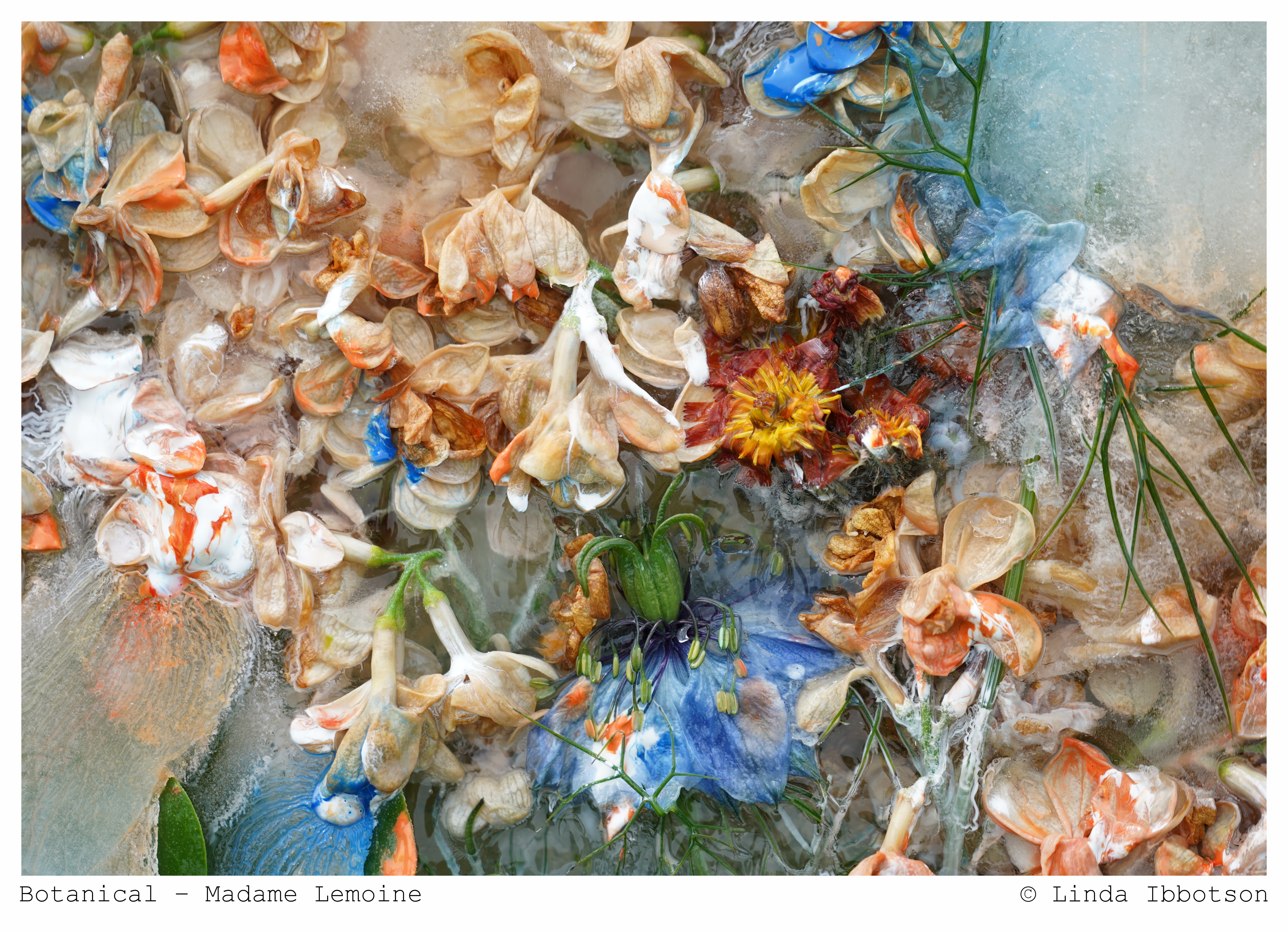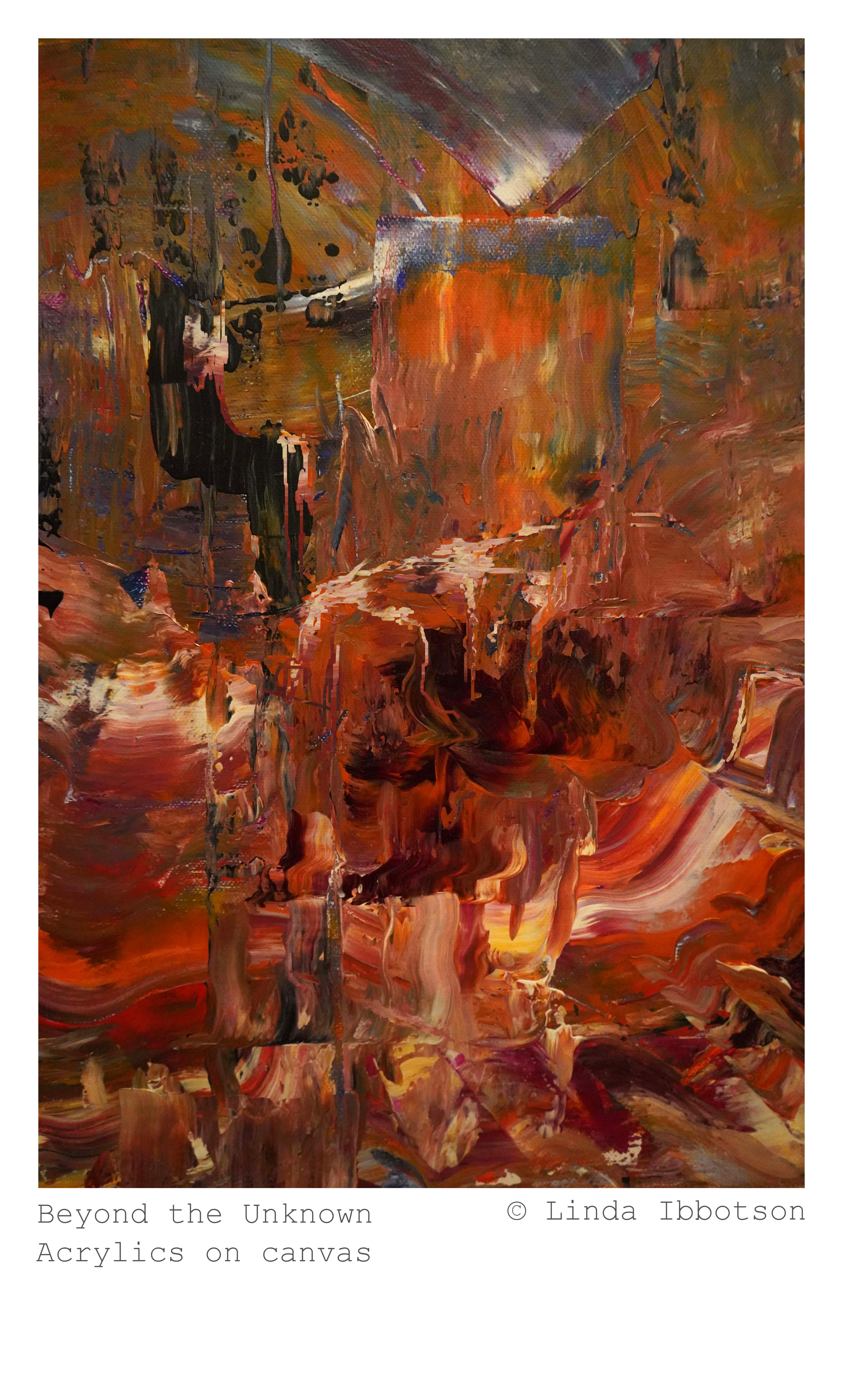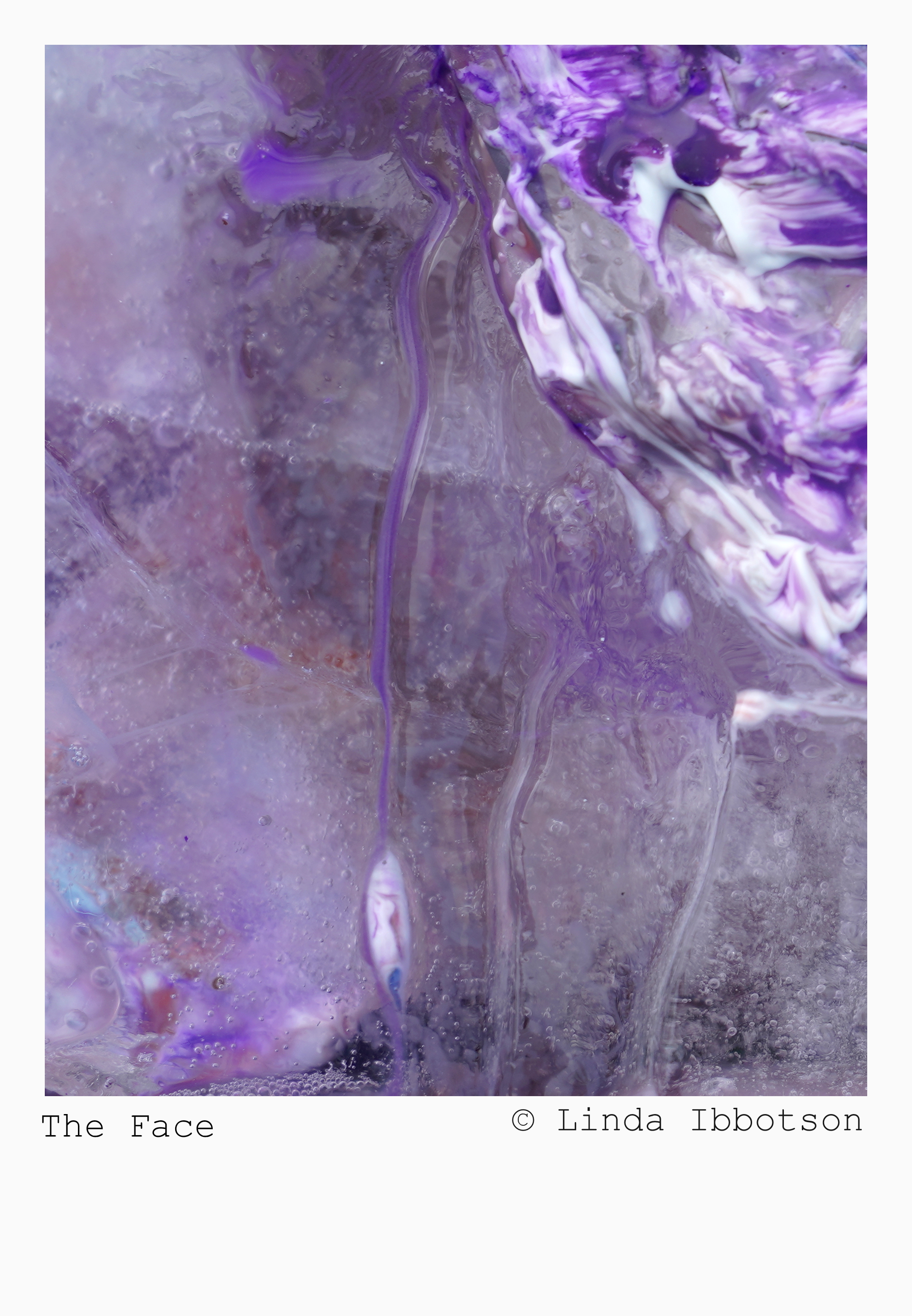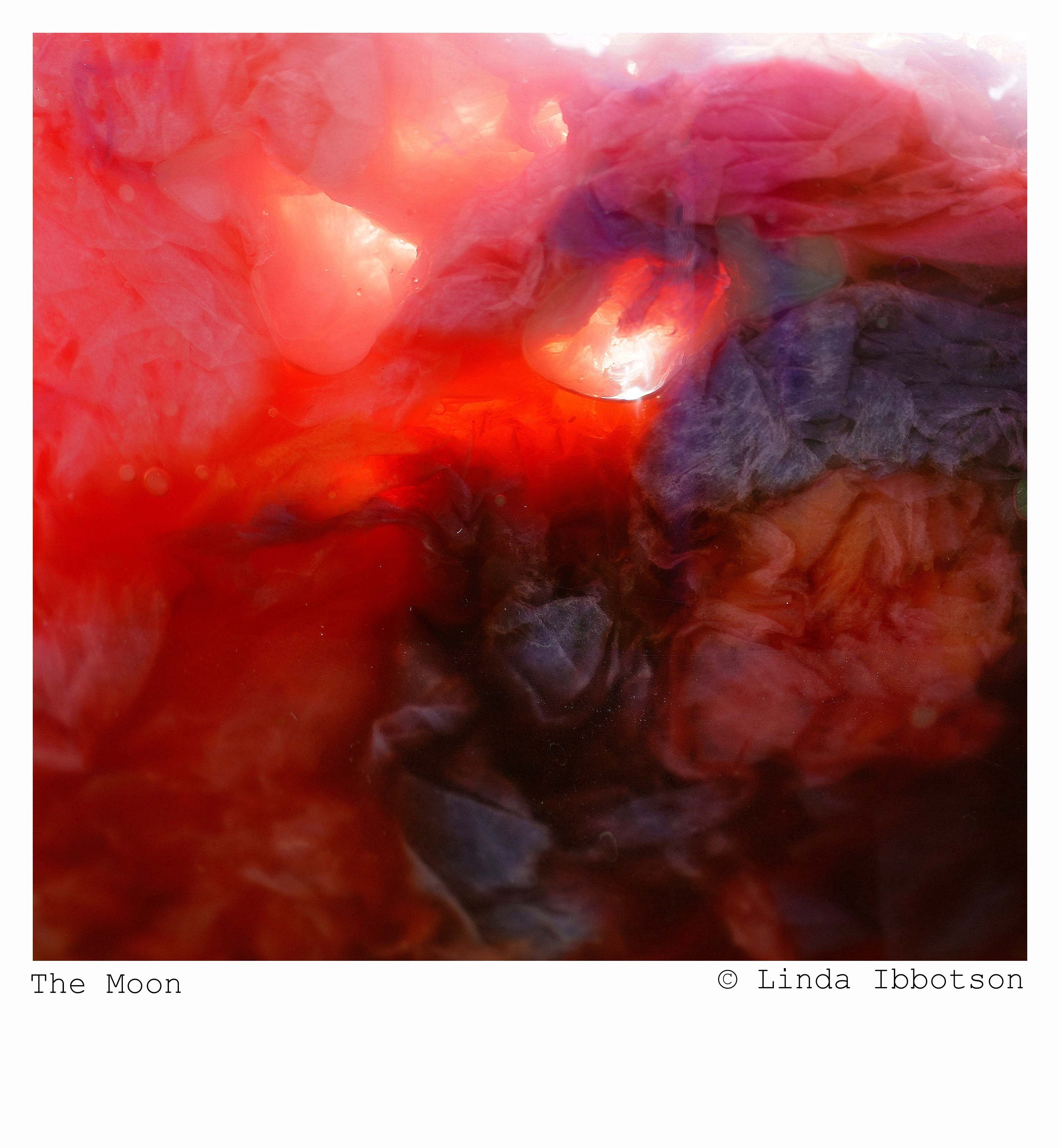Tags
Advaitam Art Movement, advaitam poetry movement, Advaitam Speaks Literary, Indian Literary Journal, Indian Literature Today, Rucksack a global poetry patchwork, the Little Museum of Poetry Italy, World Literarture, world poetry today, World's First Poetry Museum
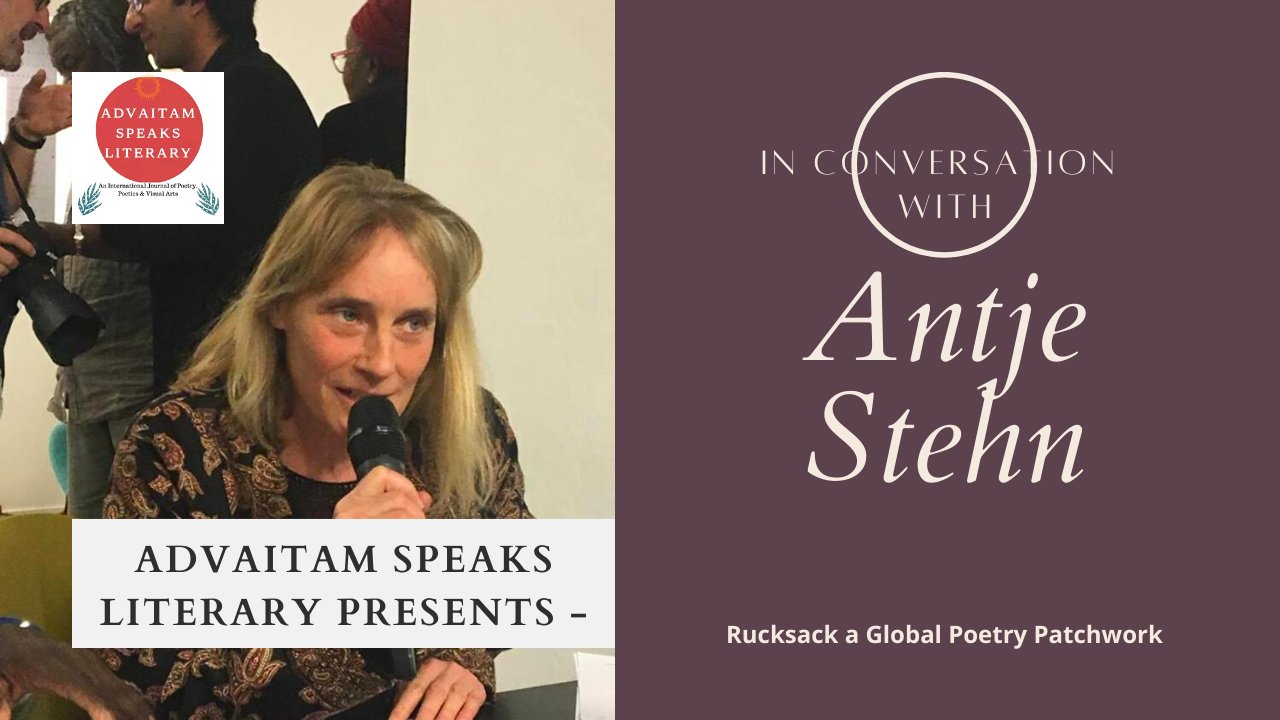






Rucksack a Global Poetry Patchworkis an international art installation project created by the artist Antje Stehn. It consists of two macro-works: an installation featuring a large bag, the Rucksack, made of dried tea bags collected by the 250 participants and an exhibition of short poems written by the poets from all over the world. A video loop installation provides the public with the opportunity to listen to the voices of the poets reciting in their mother tongues. The installation was on show at the Il Piccolo Museo della Poesia Chiesa di San Cristoforo, in Piacenza, Italy since September 2020 and the exhibition continued until 1.5.2021. Afterwards shows are planned in other countries like Republic North Macedonia, Ireland, and India. In the meantime the video readings are published on their official Youtube channel ( https://youtube.com/channel/UCaFs-2l5Tv0H-Rfkibm4N6A).
Antje Stehn (Germany) is a poet, visual artist, video producer, art curator based in Italy. Since 1990 she has been showing her work in international exhibitions around Europe and the US. She is part of the international Collective “Poetry is my Passion”. She is editing for TamTamBumBum, for Los Ablucionistas and Teerandaz. She is member of the scientific committee of the Piccolo Museo della Poesia in Piacenza, Italy. She is the brain behind ‘Rucksack a Global Poetry Patchwork’, a uniquely creative project in terms of its global collaborations, as well as its association with possibly the first ever museum in the world fully dedicated to poetry, conceived in Italy. Advaitam Speaks Literary is honoured to be one of the global collaborators in this really brilliant project born in the time of pandemic. In this Interview with Antaripa Dev Parashar and Debasish Parashar, Antje talks about Project Rucksack and shares her views on poetry and art.
ASL: ‘Rucksack a Global Poetry Patchwork’ was born in the time of a global pandemic. Please share with us the story behind its inception.
Antje: The Rucksack was born during the first Lock Down in Italy, one year ago, which was a very tough experience, as for everybody around the world. For three months we could not leave the house. In this period, we all were under a kind of shock and developed strange behaviors. I’m an artist who works with material I take from nature, like spines from trees, blowballs from dandelions , and in that period I was blocked in my work. So I looked around the house for material .I started to make little sculptures out of banana and orange skins and every morning I saved my used teabag, as a kind of ritual, without any idea. The great thing in art is, that you start doing something, with no clue in your head and than suddenly the idea pops up. In fact I always wanted to do a big Rucksack – sculpture. Rucksack in German means backpack. It’s a symbol of free travelling , of the times when it was possible to reach India from Europe through the land route , which is not possible any more ,since many years. There is another aspect which fascinates me in a Rucksack, it’s the fact that you can basically store everything you need in life in such a small space.
But to build a Rucksack out of teabags , I needed lots of them , so I started asking my poet friends to help me and to write a poem so they could also contribute with words to this art-piece. It was astonishing, everybody participated with big enthusiasm. My great poet friend Ana Maria Pedroso, from Cuba ,with who I work here in Milan, in the collective Poetryismypassion, pushed me straight away to make a proper project and a public call. Together we invented the title, so it became an initiative of our Collectivo Poetryismypassion. Once the call was in the internet it spread out all over the world. I met the great Indian poet Mamta Sagar and she became the co-curator for India, presenting 28 poets with 15 different languages. After a short time more than 250 poets with more than 56 different Languages got involved. Now the Rucksack is exhibited at the Piccolo Museum of Poetry in Piacenza, Italy, which is situated in a very special old, desecrated church. The poems are exhibited all around the backpack and there is an audio installation, so people can hear all the voices of the poets from the world in all different languages on a long audio loop. It is so wonderful to see a teabag from Ghana next to a teabag form Iceland or Mexico. It is like an upside-down Tower of Babel because it’s emphasizing the value of closeness, so significant in this historical moment marked by distance and confinement
Documentary about
Rucksack a Global Poetry Patchwork
ASL: You are curating possibly the First Ever Poetry Museum of the World under ‘Rucksack a Global Poetry Patchwork’ at Piccolo Museo della Poesia, Chiesa di San Cristoforo, Piacenza, Italy. Have you been aware of any other initiative in the cultural history of humanity, like yours, in terms of nature and scale?
Antje: The Little Museum of Poetry is directed by Massimo Silvotti and Sabrina De Canio, I am part of the scientific committee. As far as I know, this wonderful unique museum is the only Museum in the world dedicated to Poetry. It is situated in a very suggestive ambient.
ASL: Crisis is the mother of creativity. This is the dominant idea about creativity. Can there be creativity and poetry in particular, without crisis?
Antje: Of course ! Living with art and poetry is a kind of life- attitude. It means to consider the marginal things that nobody considers. You see the world with an “wide angled view”, which is then focused on certain things, creativity is a game between restricting the attention on the particular without leaving the abundance of perception . Everybody has a creative potential, it’s a question of choice , if one opens up to this potential and to oneself, you probably choose the stony way of an artist’s life. Maybe a crisis can give the kick to this, but it crisis is not a permanent condition.
ASL: ‘Rucksack a Global Poetry Patchwork’ intends to break the monopoly of dominant cultural narratives of human evolution and creativity. Has the project been able to bring the world at the margins of cultural perception to the center of cultural discourse and redefine the idea of ‘real adventure’?
Antje: In this period of forced isolation, Rucksack gave breath to our need to share, art, poetry, civil commitment. It is a poetic artistic work but also a social- literary inclusive art piece. Among our participants there are prominent famous poets, candidates for the Nobel Prize and poets who live hidden, with poetry as a second life. During these six months we designed a few sub-events to present our curation and the poems from diverse linguistic cultures in international Festivals like, The Festival Internacional de Poesía Ignacio Rodríguez Galván, in Mexico, World Poetry Day, in Bangladesh , Mothertongue Day in India with Mamta Saga, and the Festival of Ideas, in Ireland .
ASL: ‘Rucksack a Global Poetry Patchwork’ attempts to address the shared humanity in peoples cutting across societies and anticipates “a sort of nomadism that goes beyond confinement and borders and gives value to all the cultures and languages of the globe.” What kind of role does a project like Rucksack play in a global world order that increasingly revolve around ‘balance of power’ and ‘balance of threat’?
Antje: Rucksack gives value to all the cultures and languages of the globe. This does not mean cultural realtivism. The cultural systems are different, but have zones of permeability that allows continuous hybridizations, the project aims to put these into dialogue, create solidarity and cooperation networks.
ASL: ‘The Poet’s Backpack’ holds a place of special importance in Project Rucksack. The Rucksack, made of dried tea bags is part of the installation as well. Massimo Silvotti, a Director of the Piccolo Museo della Poesia, uses the phrase ‘Gandhian Features’ while referring to this integral component of installation under Rucksack a Global Poetry Patchwork’. What are the Gandhian features of this project?
Antje: Maybe Massimo Silvotti was thinking of the global dimension the project has taken. Gandhi’s idea of a non-violent resistance has spread all over the world, and many social movements, specially in the western world are still referring to these. Rucksack is not a civil disobedience project but a connecting project . The common thread are the leaves of tea and all the wonderful relationships on a cultural, historical, geographical, ritual level created over the centuries between the worlds. Worlds understood as people, habits, exchanges, and comparisons. An element taken from nature can still create a bond in a backpack of filters, and poetry literally filters the global feeling.
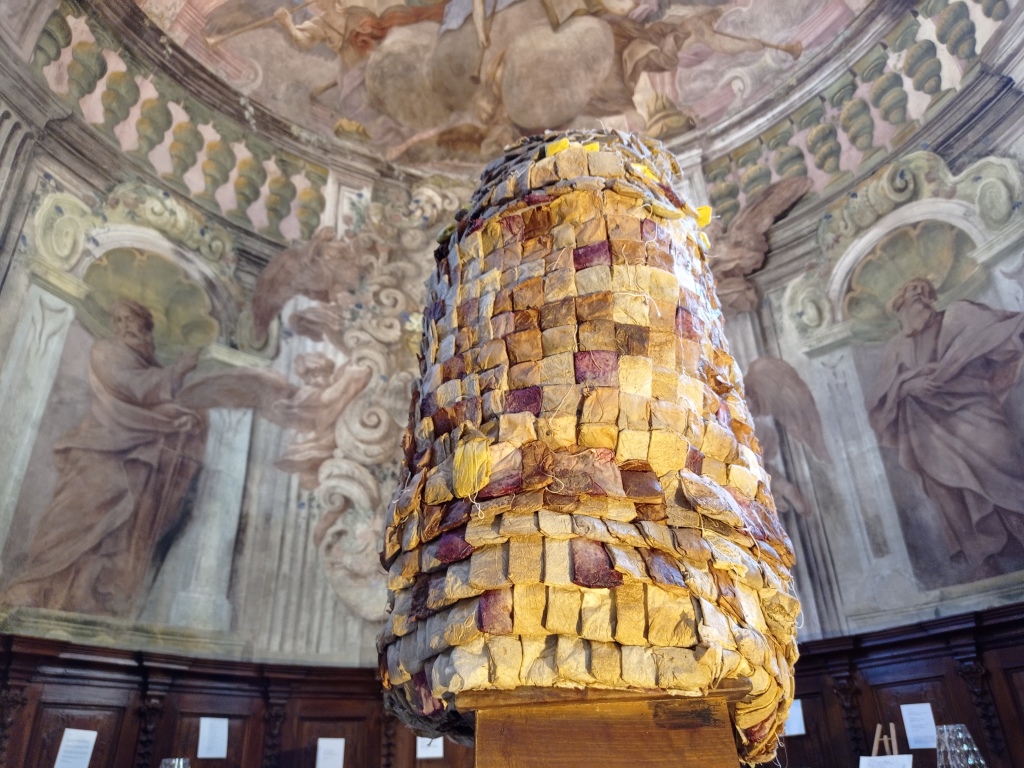
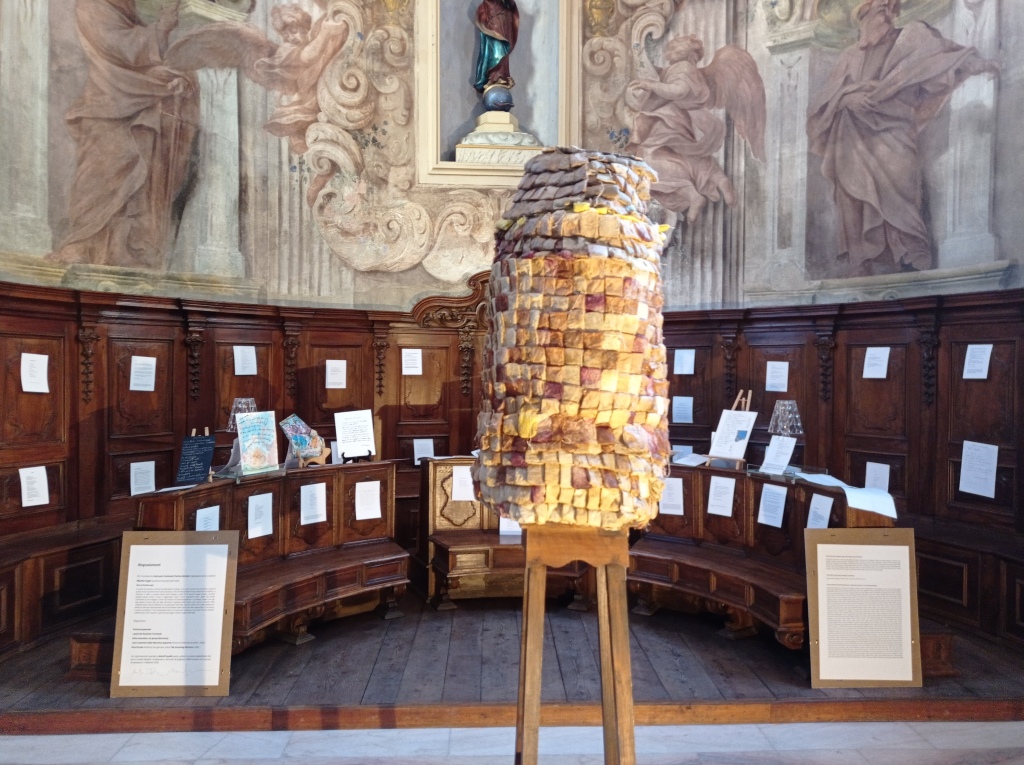
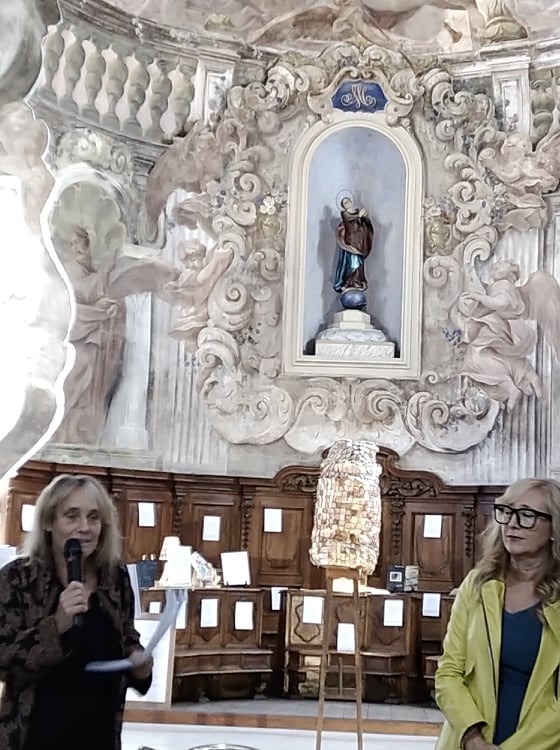
The poet’s backpack by Massimo Silvotti
The journey: hanging out in the unknown, foreseeing the possible, reviving the visible. A good traveler is primarily a human being with intellectual vivacity; ready – at times eager – to re-evaluate his own paradigms of life. At the Poetry Museum we love to travel. Indeed, as we have conceived it, the museum itself is our journey. Every single window, every object it contains, is a journey into the unfathomable. Maybe it is because Poetry is motion to place. Always a step ahead, in step, sometimes backwards, of humanity. Try to imagine a poet’s backpack, indeed I ask you for a further effort; could you imagine a column of poets, a few hundred, walk, walk, cross the world with a single, magical, backpack? Shoulder to shoulder, with a vibrant, supportive, thirst-quenching joy.
I’m talking about a concrete, tangible project; of a performance and a great artist. I’m talking about a rather odd backpack, and one of the oldest drinks known. An installation, a work of art, a simple backpack, but entirely made up of dried tea bags, which have come from all over the world, from over 50 countries, from over 250 poets, who, to the tea bags, already carry imbued and silent with persistent life stories, they have added traveling poems to them. A travel bag, a humble drink, a few hundred poems; distant, even unknown languages.
This backpack that is container and content at the same time; this backpack like an upside-down Tower of Babel, where languages are observed, communicated, fraternized. A backpack that makes us believe it is possible that the disorientation of these times; the weight, the fatigue, the pain itself of this viral burden of ours, may diminish, may be relieved, may socialize, step by step, from breath to breath, from voice to voice. This backpack speaks to each of us individually, I believe. It speaks to us of a generative and regenerative will: mater et pater. It speaks to our pressing need to socially start living again. It speaks for sure to me, that the more the years pass, the more I want to cross a desert of flowers with that backpack on my shoulder; speaks to Sabrina De Canio (director of the international area of the museum) who believed most of all in this project, favoring its benevolent contagiousness in the literary world; he speaks above all to, and of, Antje Stehn, a genius artist and poet, with whom we are honored to collaborate artistically.
This backpack of hers and ours is exhibited at the Museum (and will become part of the permanent collection), and the tea bags, of a hundred and more colors, I heard them talking to each other at night. But because of Covid, hardly anyone was able to sip this work with Gandhian features. And yet the Backpack never stopped walking; in India, just to cite the most representative example of the number of poets involved (the poet Mamta Sagar, co-curator of the project, managed to involve poets from 15 different Indian languages), during a press conference held in recent months for understanding and spreading this idea of the Rucksack to Global Poetry Patchwork, Antje and Sabrina were asked to outline its most hidden meanings. But in fact, from Mexico to Ireland, from Bangladesh to Canada and again and again, half the poetic – artistic world knows, appreciates and supports this performance which I would not hesitate to define as ecumenical. To us, everything moves emotion. It is moving because it makes us believe a little naively that the world is something different from what we are commonly told. It is moving because it makes us feel perhaps that we ourselves can be that world we have longed for.
(Massimo Silvotti is director of the Piccolo Museo della Poesia , Chiesa di San Cristoforo , Piacenza ,Italy)
ASL: Tea bags can be a historical symbol of cultural exchange and migration of ideas. At the same time, tea was a major component of colonial trade in the colonial era. It was through colonial trading practices that tea reached the West from the East. Tea automatically comes with the baggage of colonial legacy as a cultural symbol. Why tea?
Antje : Tea bags have a long history dating back to the eighteenth century, when the Chinese started sewing small square bags to better preserve the aroma of the different teas. From around a thousand years ago, the Tea Horse Road was a trade link from Yunnan to Tibet; one war horse from Tibet was traded for 20-60 kilo of tea from China. The teabags in the Rucksack include also herbal teabags, that is why it’s so colorful. Tea bags continue to be one of the smallest containers that we use and find in every home. Carrier bags were among the first tools used by women and men to carry objects and memories. Our ancestors were hunter-gatherers, but actually gatherers were predominant, given that 80% of their food came from collecting seeds, roots, fruits in nets, bags and in any type of light container. Bags were important tools for transporting goods, yesterday just like today, as we can see bags being used as shopping containers in the supermarkets. This is why we decided to place the tea bag at the center of attention, as the heart of a cultural meeting, and the Rucksack as a trace of our bond with nature and migration.
WHY TEA? WHY POETRY?
“Tea bags have a long history dating back to the eighteenth century, when the Chinese started sewing small square bags to better preserve the aroma of the different teas. Tea bags continue to be one of the smallest containers that we use and find in every home. Carrier bags were among the first tools used by women and men to carry objects and memories. Our ancestors were hunter-gatherers, but actually gatherers were predominant, given that 80% of their food came from collecting seeds, roots, fruits in nets, bags and in any type of light container. Bags were important tools for transporting goods, yesterday just like today, as we can see bags being used as shopping containers in the supermarkets. This is why we decided to place the tea bag at the center of attention, as the heart of a cultural meeting, and the Rucksack as a trace of our bond with nature and migration.
However, we cannot but wonder why are depiction of great hunting scenes predominant on the walls of caves rather than people busy harvesting and carrying bags to collect food? This question also occurred to Ursula K. Le Guin, a science fiction writer who wrote the so-called Carrier Bag Theory of Fiction, based on the Carrier Bag Theory of Human Evolution by anthropologist Elizabeth Fisher. Le Guin noted that it is difficult to tell a story about how seeds are extracted from the peel, day after day in the same way. Hunting, on the other hand, is a real adventure, full of dangers and surprises, its final apotheosis being the killing, when a huge mammoth, for example, falls to the ground. This is material for an action story and it is what our ancestors probably told each other sitting around the fire. But also, tragically, it marks the beginning of the normalization of violence and of a narrative focused on it. The act of gathering, on the other hand, had little narrative potential; at best it was suitable for poetry dealing with the world at the margins, that few cares about. However, on closer inspection, poetry tells us about a different look at the world, of an alternative to the monopoly generated by a single story. This is the reason why the project includes the Rucksack made with recycled tea bags, a collection of short poems by the participants and an audio loop.” ~ Rucksack a Global Poetry Patchwork.
ASL: The idea of migration is a double-edged sword. It has its gifts as well as its curses. Please elaborate your idea of migration and its relationship to poetry.
Antje: Yes, unluckily our societies do not consider immigrants as an enrichment, but they focus on the problems which of course are not missing. Art and poetry are migrating since contemporary art exists. The first important art movements like Surrealism and Dadaism were international movements right from the beginning.
ASL: Visiting and travelling are two related, but different ideas. Travelling is associated with freedom of the mind in the real sense. What is your opinion regarding the same?
Antje : Yes, normally you visit someone you already now, while travelling means to be open for new encounters. An artist is an eternal traveler. Rucksack has created a very strong networking among all the participating poets and this is an alternative way to travel from one country to the other , people build bridges, get to know each other, this is a real adventure for me.
Rucksack Channel with videos of Participants :
https://youtube.com/channel/UCaFs-2l5Tv0H-Rfkibm4N6A
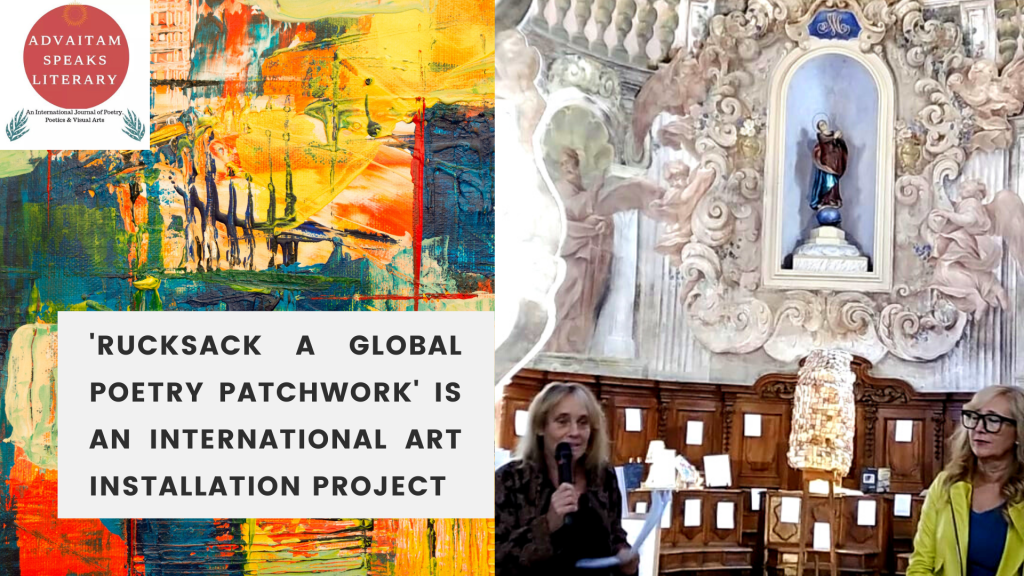
ASL: What is the most significant contribution of social media in redefining the idea of poetry in modern times? What is the significance of curating poetry physically in the age of social media, big data and digitalization?
Antje: The internet gives us a big opportunity to connect to each other, but as we know social media’s design is meant to nurture an addiction, manipulate us , and it is monopolized by a few top tech companies and social media platforms such as Facebook, Google, and Apple.
ASL: Creative networking is an essential component of your project and poetic vision. Please share your views on the same.
Antje: In the Rucksack Installation , all participants become part of a collective. This is special, because artist normally are individualists. It is important to develop your art, become a good artist, be highly creative but it is also very important to do networking, to use art as a means of communication to go beyond the traditional places which are consecrated for art.
ASL: Please tell us about the Team behind ‘Rucksack a Global Poetry Patchwork’. Who are your present and upcoming collaborators?
Antje : One of the first collaborators of this Poetryismypassion project, as I said before , is Ana Pedroso, from Cuba who lives in Milan. We work together in our Collective Poetryismypassion which organizes events with the international artist community in Milan. We are a perfect mixture of working-mentality, she has the Latin spontaneity and I have the German organization. In these three years we have organized more than 50 events in different places in Milan. We brought poetry to strange places like Jazz clubs, fashion fairs, In the courtyards, on the street. The aim is to bring poetry to people who normally don’t listen to poetry and get into comunication.
The first co-curator of Rucksack from the very beginning was Mamta Sagar who organizes Kaavya Sanje in India. For the second edition we added new curators: Viviana Fiorentino for Ireland and Igor Pop Trajkov,and Daniela Andonovska-Trajkovska for the Republic of North Macedonia who will after the Covid Pandemic organize Rucksack- exhibitions in their countries.
And we have a long list of collaborators, La macchina sognante (Italy) ,The Dreaming Machine (US), Letters with Wings (Ireland); Teerandaz (Bangladesh),Time of the Poet Republic, (Zimbabwe), World City Monthly (Canada) ,Los Ablucionistas (Messico), Cervena Barva Press (USA), Erkut Tokman (Turkey), J’an Argana (Maroc/Italy) the international group Poetas Sin Fronteras – Poets Without Borders and of course Advaitam Speaks Literary . With all these collaborators we organize Rucksack – Reading Events in their countries.
ASL: Can poetry change the world?
We have to change this world before it’s too late . We are not just threatened by the Covid Virus, but we are in the middle of a most dangerous Climate Crisis . The artists have an important role . As an artist, one has the task of analyzing the habitus of one’s own time , which are the collective forms of thinking of the contemporaneity and trying to understand what’s going on and communicate this to others. There is term which actually comes from the Buddhist tradition ,which is “mindfulness”, it means, receptive attention to current processes and experiences to do this you need curiosity, openness, acceptance .
***********************************************************************************
(This Interview script is prepared by Antaripa Dev Parashar and Debasish Parashar for Advaitam Speaks Literary journal).
Brief Bio-notes of the Curators:
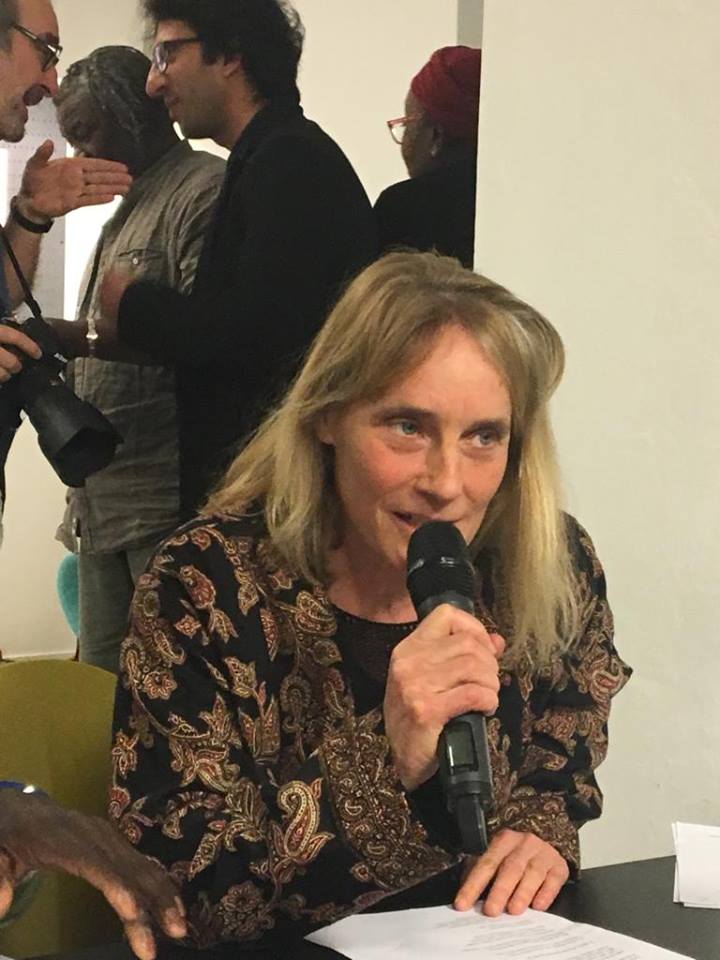
Antje Stehn
Antje Stehn (Germany) is a poet, visual artist, video producer, art curator based in Italy. Since 1990 she has been showing her work in international exhibitions around Europe and the US. She is part of the international Collective “Poetry is my Passion”. She is editing for TamTamBumBum, for Los Ablucionistas and Teerandaz. She is member of the scientific committee of the Piccolo Museo della Poesia in Piacenza, Italy.
Antje’s Youtube Channel :
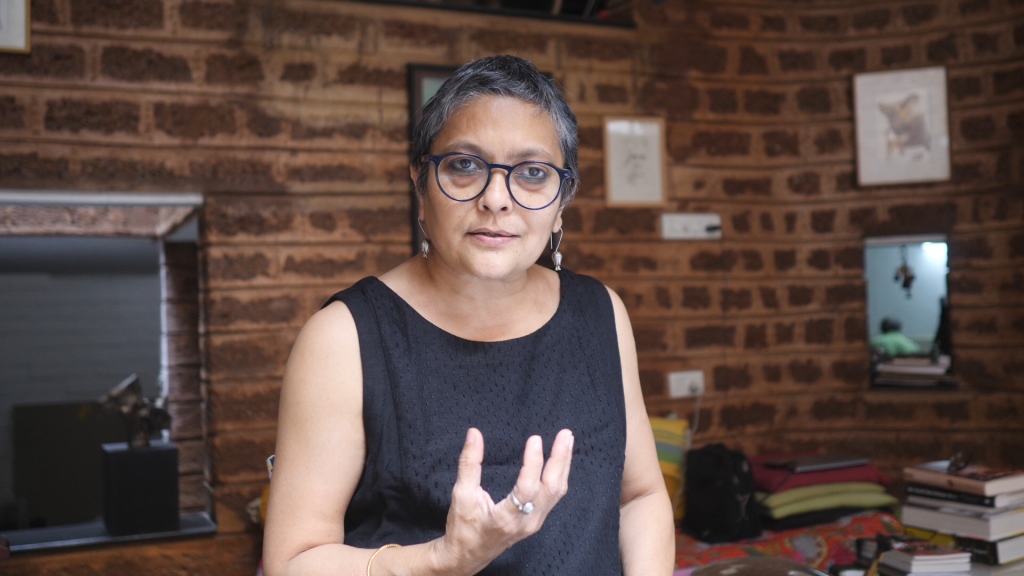
Mamta Sagar
Mamta Sagar (India)is a noted Kannada poet, playwright and translator from Bengaluru. She is the founder director of Kaavya Sanje Trust. Presently she teaches at the Srishti-Manipal Institute and is based out of Bengaluru, India.
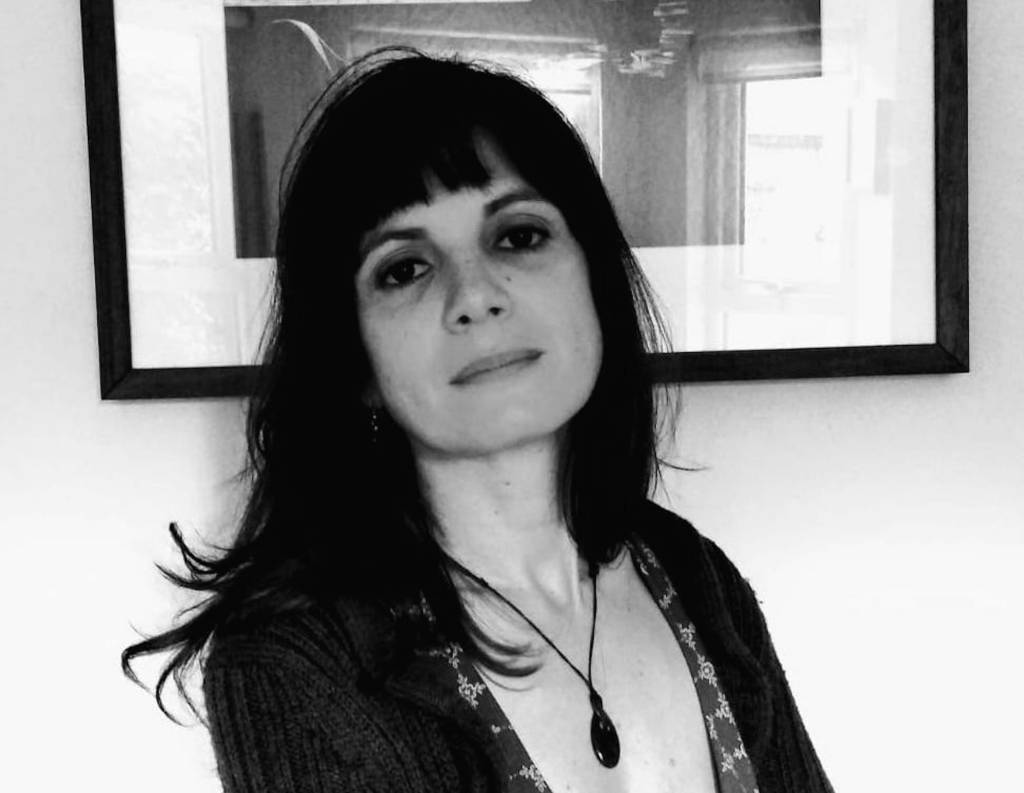
Viviana Fiorentino
Viviana Fiorentino (Ireland /Italy) is a poet, translator, activist of the organization Letters with Wings.
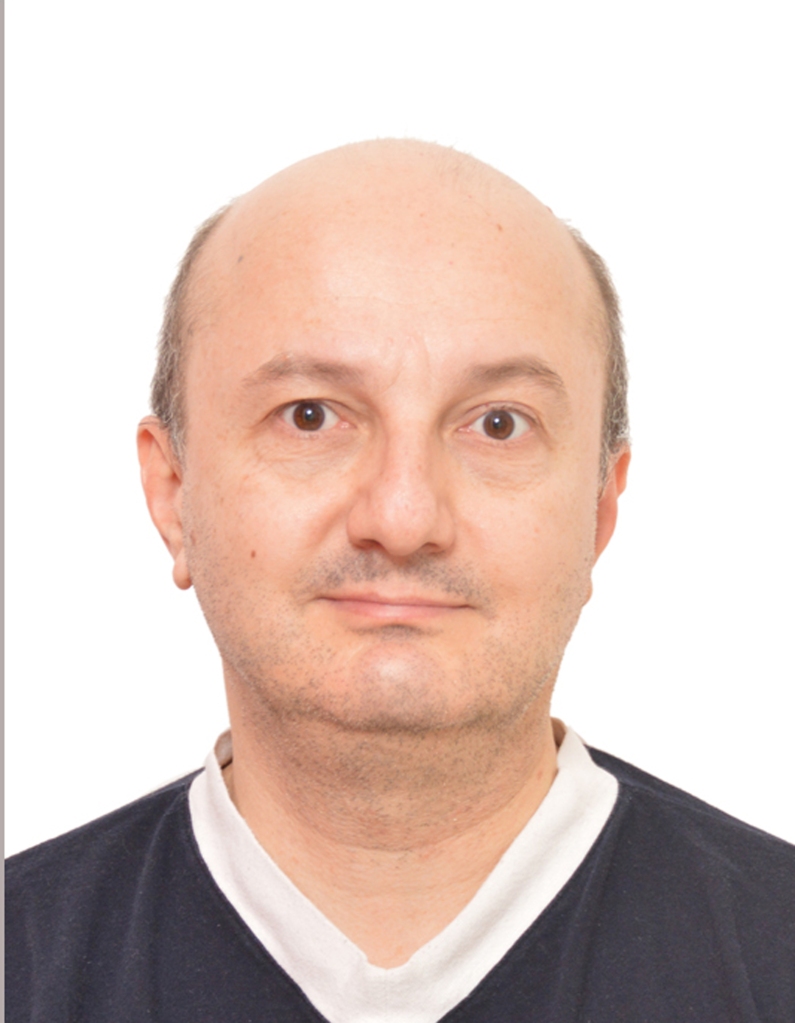
Igor Pop Trajkov
Igor Pop Trajkov (Republic of North Macedonia) is a renewed writer and filmmaker.
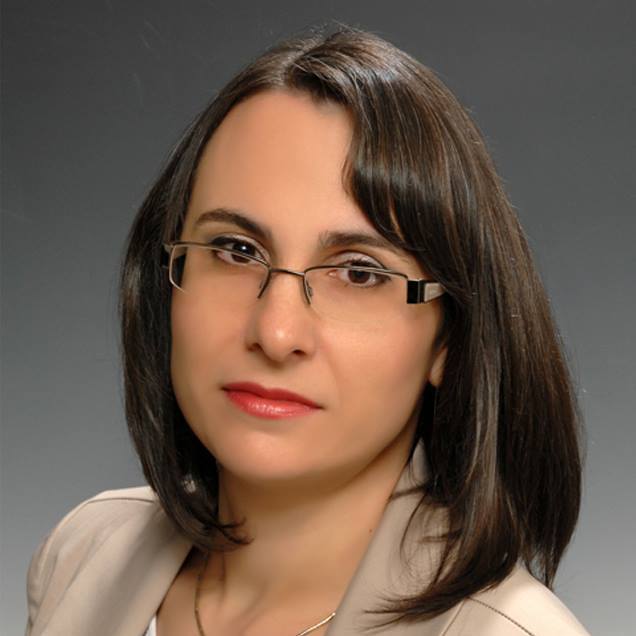
Daniela Andonovska-Trajkovska
Daniela Andonovska-Trajkovska (Republic of North Macedonia) is poet, scientist, editor of the literary Magazines “Rast” and “Growth”, university professor.
*********************************************************************************************************


